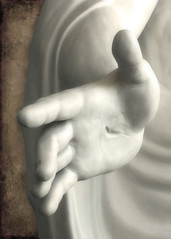When I was asked to plan our ward's Christmas party, I had this crazy idea to extend the celebrations beyond just one single night. Why not celebrate for a whole month!? And so I read about Advent and concocted an idea of how to implement the season into our worship and our celebrations in a way that was consistent with Mormon meeting schedules. I chose readings from the liturgical calendar that adapted well into Sacrament meeting talks. I suggested that we invite the members of the congregation to come to church dressed in traditional colors (purple, blue, red, and gold) to build a sense of unity and anticipation. We would focus on the expectation of the arrival of our Savior, think on what His arrival meant to us collectively and individually, and look forward to His return.
In a stunning irony, the plan was shut down because, apparently, asking men to wear colored shirts to church is "too traditional1."
Coming up with the idea has been hugely beneficial to me personally, however. I got to ponder the following scriptures in the context of the coming of the Savior:
- Isaiah 64:19
- Psalm 80:1-7, 16-18
- 1 Corinthians 1:3-9
- Isaiah 40:1-11
- Psalm 85:12, 8-13
- 2 Peter 3:8-15
- Isaiah 61:1-4, 8-11
- Psalm 126
- John 1:6-8, 19-28
- Luke 1:26-38
This Advent focus on Christmas has really enriched my understanding of the Christmas season. Advent is a time of anticipation. It's a time where we can put ourselves in the mindset of those who were waiting for the Savior to come; of those who were looking forward to being saved. And I was able to ask, "what do I expect he will save me from?"
As I thought about this question, and I'm still not sure I have a good answer to it, I ran into a few conversations that discussed the state of "the World2." More specifically, about how the world was going to hell in a handbasket and that we would need Christ to return to earth to save us from all this wickedness. "We are seeing the signs of the times!" goes the refrain. The phrase that hit me like a ton of bricks was "[in that day] the love of men shall wax cold" (D&C 45:27).
What really struck me, though, were the examples that were cast about as illustrations of the World's wicked state.
President Obama's executive action on immigration, for instance, was used as an example. Apparently, we need Christ to come redeem the earth from the tyrannical impact of immigration reform. The outrage seemed to be split between the gall of the executive action itself and the idea of permitting anyone a path to citizenship after coming illegally3. And as I listened to these comments, I couldn't help but notice just how wrong-headed Americans (Mormons and non-Mormon alike) are about this issue. For the die hard conservatives, let me just point out that building a wall and mass deportation are idiotic ideas. For the die hard liberals, let me point out the all-out amnesty is an idiotic idea. In fact, every immigration reform idea I've heard in the past year is idiotic. Because not one of them deals with the problem.What really struck me, though, were the examples that were cast about as illustrations of the World's wicked state.
We talk about immigration like it's a burden on us poor, victimized Americans. Many in the church talk about the imperative to obey, honor, and sustain the law (Article of Faith 12). I agree that we should obey the law. But when push comes to shove, there is no wall I won't scale, no border I won't cross, and no law I won't break if it means feeding and clothing my children. I'd go to hell and back--or even just take the one way train to hell--to prevent their suffering. Why would I expect Central and South Americans to behave any differently?
That is to say that our immigration problem doesn't reside in the US. It resides in poverty and corruption stricken countries. It resides in those areas of the world where there is so little hope and opportunity, that people will risk everything to escape to the US where they might live "comfortably" on a minimum wage (or less) job. The solution to our immigration problem isn't more bureaucracy; it's relief from poverty. But we seem to be too self-absorbed in "American Exceptionalism4" to grasp that.
In that day, the love of men shall wax cold.
In the past weeks, I've listened to a number of Mormons complain about the racial divisions being promoted by those protesting the results of the Michael Brown and Eric Garner deaths. "These people were criminals!" they say, and it is a vindictive racial political machine that is turning this into an issue for the sake of money and power. Some of that may be true. Objectively speaking, in the case of Michael Brown, perhaps he wasn't the best poster child for racial tensions in the USA. But it's an incredible leap of hubris to say that there aren't deeply seated racial issues at play here. And it takes either ignorance or malice to claim that the rage that is boiling over is the result of pure opportunistic money grabbing and not decades of abuses and frustrations.
I live in a ward with African American members who personally witnessed crosses burning and klansmen riding. They remember the fear and intimidation that was used as a weapon to gain their submission, and they remember the government and law enforcement institutions that looked the other way. This is recent history! and the scars have not had time to heal, nor have the after effects been resolved. But we seem to be too self-absorbed in our post-racial America to believe it.
In that day, the love of men shall wax cold.
Over the years I've been in my congregation, I can't remember how many times I've heard someone say, "I can't wait until the day that we have a temple in Kirtland." Kirtland, for those of you who aren't familiar with the geography of northeast Ohio, is about a 30 minute drive out of the city of Cleveland. It is an affluent city with no major public transportation lines. A temple in that area would be great...for people with cars; for people with good, stable jobs; for people with money. A temple in Kirtland is no more accessible to the poor and those desperately in need of the Temple's blessings than the temple in Columbus (2.5 hours drive away). But a temple on a major public transportation line in Cleveland would be too ugly a location in "a bad neighborhood." It would be beneath the sensibilities of the privileged, affluent Mormon to go to such a location to worship.
In that day, the love of men shall wax cold.
And now, all of a sudden, I'm wondering if we have this whole Second Coming thing right. I'm pretty sure we don't, as a matter of fact. Sure, I have no doubt that "the World" could turn so wicked that Christ has to come back to save us from tearing the Earth to pieces. But I don't think that will be a happy day.
As I've pondered the arrival of the Savior this Advent, I've made the connection that so many people at the time were looking forward to the Savior's arrival to rescue them from political entrapment; to save them from the Romans; to establish them as a free nation again. They were looking for a Savior to save them from "The World."
But Christ didn't save them from the World. Christ chastised the religious developments and the zealotry. He completely upended the religious institution. He effectively said, "You screwed up my Church, and I'm here to fix it."
If the world gets so bad that Christ has to come back to save us from it, I expect he'll greet us with the loving chastisement of, "Wow, you guys really screwed this up."
But I think there's another way. I'm not convinced any longer that the World devolving into wickedness is a prophecy that must come true. Instead, we were given the promise that if it did come to that, Christ would rescue us. But I don't believe that he has to rescue us.
What if we could change the story? Could we take seriously the words of Isaiah:
Thou meetest him that rejoiceth and worketh righteousness, those that remember thee in thy ways (Isaiah 64:5)What if we were to change the way we think, and how we approach our problems? What if we were to try to think outside ourselves more and develop the kind of knowledge and understanding of each other that would build bridges and solve difficult problems?
I believe that we could build a world that is so righteous that Christ will return not to save us from wickedness, but to celebrate our righteousness. I believe that we can build a world that would be so pleasing to the Savior that he would meet us and celebrate with us.
But to do so, we have to stop looking to be saved from the external. We have to stop seeing the problem as The World and start seeing the problem as Ourselves. We must not let our love wax cold, but set it afire with the flames of empathy, compassion, and cooperation.
I posed the question earlier, "what do I want the Savior to save me from?" And I said earlier that I didn't quite know how to answer that. I think now I do. I want the Savior to rescue me from selfishness, from greed, and from my own predjudices. And it's a good thing we believe in an infinite Atonement, because it might take every bit of infinity for the Savior to rescue me from myself.
1 There is a long cultural tradition of men wearing white shirts to church, much like Mormon missionaries. This tradition is so engrained that some call the white shirt, tie, and suit coat the "uniform of the priesthood." (gag)
2 For Mormons, the World is pretty much anything not Mormon and is typically used as a pseudonym for anything perceived to be uninspired or ungodly. Like celebrating Advent.
3 The Church's official stance on immigration policy is actually quite moderate and admirable. But it's a position that seems to be lost on many individual Mormons.
4 If ever I've heard a vomit inducing phrase, that would be it. How about "Human exceptionalism?" But even that is sullied by human depravity. But I digress.








